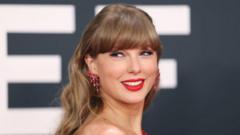A recent BBC investigation uncovers concerning health misinformation propagated on the Diary of a CEO podcast, as guests, often unchallenged by host Steven Bartlett, dispute conventional medical practices, risking public health awareness.**
Steven Bartlett’s Diary of a CEO Under Fire for Spreading Health Misinformation**

Steven Bartlett’s Diary of a CEO Under Fire for Spreading Health Misinformation**
BBC investigation reveals alarming health misinformation shared on Steven Bartlett’s popular podcast, challenging guests' questionable claims.**
Amid a surge in popularity, the Diary of a CEO podcast hosted by Steven Bartlett faces serious scrutiny due to a BBC investigation highlighting the spread of dangerous health misinformation. The findings reveal that several claims by guests, including the idea that a keto diet alone could treat cancer, were presented with minimal opposition or critical analysis from Bartlett, leading experts to voice alarm over the potential risks of creating distrust in conventional medicine.
In a comprehensive review of 15 health-focused episodes, the BBC World Service discovered that on average, each segment contained around 14 scientifically disproven health assertions. Despite this alarming trend, Bartlett's production company, Flight Studio, maintains that guests are thoroughly vetted, suggesting their “freedom of expression” approach provides valuable insights.
Originally focused on entrepreneurship, the podcast has shifted its emphasis toward health discussions over the past year. This pivot has coincided with a significant increase in views, jumping from nine million monthly to about 15 million, as Bartlett features guests touted as leading health authorities. Critics argue that the unchallenged spread of false claims—such as anti-vaccine rhetoric and dietary regimens purportedly capable of reversing serious health conditions—can mislead listeners and endanger their wellbeing.
Expert analyses conducted by four medical professionals, including oncology and public health specialists, found numerous harmful statements that lacked evidence. Notably, prominent guest Dr. Aseem Malhotra has faced backlash for his views on Covid vaccines, which contradict extensive research affirming their efficacy. Bartlett justified airing these views by positing that "the truth is usually somewhere in the middle," evoking historical figures facing criticism for their ideas.
The lack of regulatory oversight for podcasts in the UK allows Bartlett to navigate around established broadcasting standards, thereby maintaining his platform without consequence. As health misinformation continues to proliferate, experts emphasize the dangerous allure such narratives hold for audiences searching for seemingly straightforward solutions to complex health issues.
Furthermore, skeptics flagged Bartlett’s financial ties to health and wellness companies as a potential conflict impacting his choice of guests and topics, which include controversial claims and products. Instances of misleading product promotions, such as the "Ear Seeds" debacle on BBC Two, have also raised concerns around accountability in the information shared.
As the discourse around health misinformation intensifies, the implications of platforms like Diary of a CEO underscore the necessity for critical examination and responsible communication in the rapidly evolving landscape of digital media and public health discourse.




















